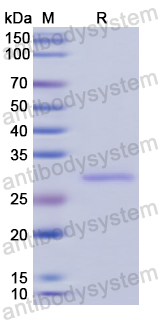Catalog No.
YHC86701
Expression system
E. coli
Species
Homo sapiens (Human)
Protein length
Pro477-Glu731
Predicted molecular weight
30.81 kDa
Nature
Recombinant
Endotoxin level
Please contact with the lab for this information.
Purity
>90% as determined by SDS-PAGE.
Accession
P11216
Applications
ELISA, Immunogen, SDS-PAGE, WB, Bioactivity testing in progress
Form
Lyophilized
Storage buffer
Lyophilized from a solution in PBS pH 7.4, 0.02% NLS, 1mM EDTA, 4% Trehalose, 1% Mannitol.
Reconstitution
Reconstitute in sterile water for a stock solution. A copy of datasheet will be provided with the products, please refer to it for details.
Shipping
In general, proteins are provided as lyophilized powder/frozen liquid. They are shipped out with dry ice/blue ice unless customers require otherwise.
Stability and Storage
Use a manual defrost freezer and avoid repeated freeze thaw cycles. Store at 2 to 8°C for frequent use. Store at -20 to -80°C for twelve months from the date of receipt.
Alternative Names
Glycogen phosphorylase, brain form, PYGB
Identification of mitophagy-related key genes and their correlation with immune cell infiltration in acute myocardial infarction via bioinformatics analysis., PMID:39872885
Ubiquitin-related gene markers predict immunotherapy response and prognosis in patients with epithelial ovarian carcinoma., PMID:39448713
PYGB targeted by androgen receptor contributes to tumor progression and metabolic reprogramming in esophageal squamous carcinoma., PMID:39442902
Evaluation of potential novel biomarkers for feline hypertrophic cardiomyopathy., PMID:39395261
TMT-Based Quantitative Proteomic Profiling of Human Esophageal Cancer Cells Reveals the Potential Mechanism and Potential Therapeutic Targets Associated With Radioresistance., PMID:39375892
The importance of muscle glycogen phosphorylase in glial cells function., PMID:38661212
Computational Insights into Novel Inhibitor N-(3-(tert-Butylcarbamoyl)-4-methoxyphenyl)-indole and Ingliforib Specific against GP Isoenzyme Dimers Interaction Mechanism., PMID:37446571
METTL3-mediated m6A methylation of PYGB facilitates pancreatic ductal adenocarcinoma progression through the activation of NF-κB signaling., PMID:37422970
Glycogen-fuelled metabolism supports rapid mucosal-associated invariant T cell responses., PMID:37307453
Distribution of Exonic Variants in Glycogen Synthesis and Catabolism Genes in Late Onset Pompe Disease (LOPD)., PMID:37185710
A Novel 5-Chloro-N-phenyl-1H-indole-2-carboxamide Derivative as Brain-Type Glycogen Phosphorylase Inhibitor: Validation of Target PYGB., PMID:36838691
The Proteome Signatures of Fibroblasts from Patients with Severe, Intermediate and Mild Spinal Muscular Atrophy Show Limited Overlap., PMID:36078032
Liver glycogen phosphorylase is upregulated in glioblastoma and provides a metabolic vulnerability to high dose radiation., PMID:35764612
TCR activation directly stimulates PYGB-dependent glycogenolysis to fuel the early recall response in CD8+ memory T cells., PMID:35738262
Proteomic-Based Machine Learning Analysis Reveals PYGB as a Novel Immunohistochemical Biomarker to Distinguish Inverted Urothelial Papilloma From Low-Grade Papillary Urothelial Carcinoma With Inverted Growth., PMID:35402263
A Reductionist Approach Using Primary and Metastatic Cell-Derived Extracellular Vesicles Reveals Hub Proteins Associated with Oral Cancer Prognosis., PMID:34186243
Woody breast myopathy broiler show age-dependent adaptive differential gene expression in Pectoralis major and altered in-vivo triglyceride kinetics in adipogenic tissues., PMID:34087697
Integration of transcriptomics and metabolomics reveals anlotinib-induced cytotoxicity in colon cancer cells., PMID:33798683
Glycogen phosphorylase B promotes cell proliferation and migration through PI3K/AKT pathway in non-small cell lung cancer., PMID:33336613
PYGB Promoted Tumor Progression by Regulating Wnt/β-Catenin Pathway in Gastric Cancer., PMID:32462986
PYGB facilitates cell proliferation and invasiveness in non-small cell lung cancer by activating the Wnt-β-catenin signaling pathway., PMID:32191839
Inhibition of brain-type glycogen phosphorylase ameliorates high glucose-induced cardiomyocyte apoptosis via Akt-HIF-1α activation., PMID:31905009
Glucagon regulation of carbohydrate metabolism in rainbow trout: in vivo glucose fluxes and gene expression., PMID:31767730
The Molecular Misreading of APP and UBB Induces a Humoral Immune Response in Alzheimer's Disease Patients with Diagnostic Ability., PMID:31654319
Glycogen phosphorylase B promotes ovarian cancer progression via Wnt/β-catenin signaling and is regulated by miR-133a-3p., PMID:31627092
Breast cancers utilize hypoxic glycogen stores via PYGB, the brain isoform of glycogen phosphorylase, to promote metastatic phenotypes., PMID:31536495
Beef tenderness and intramuscular fat proteomic biomarkers: Effect of gender and rearing practices., PMID:30894324
The plasma peptides of ovarian cancer., PMID:30598658
Differential proteomic analysis of endometrial fluid suggests increased inflammation and impaired glucose metabolism in non-implantative IVF cycles and pinpoints PYGB as a putative implantation marker., PMID:30169642
Silencing of PYGB suppresses growth and promotes the apoptosis of prostate cancer cells via the NF‑κB/Nrf2 signaling pathway., PMID:30106110
Beef tenderness and intramuscular fat proteomic biomarkers: muscle type effect., PMID:29892502
PYGB siRNA inhibits the cell proliferation of human osteosarcoma cell lines., PMID:29845265
Extracellular Vesicles Released by Cardiomyocytes in a Doxorubicin-Induced Cardiac Injury Mouse Model Contain Protein Biomarkers of Early Cardiac Injury., PMID:29070527
Glycogen metabolism in brain and neurons - astrocytes metabolic cooperation can be altered by pre- and neonatal lead (Pb) exposure., PMID:28916327
Sodium valproate increases the brain isoform of glycogen phosphorylase: looking for a compensation mechanism in McArdle disease using a mouse primary skeletal-muscle culture in vitro., PMID:25762569
KIAA1199 interacts with glycogen phosphorylase kinase β-subunit (PHKB) to promote glycogen breakdown and cancer cell survival., PMID:25051373
Comparison of gene and protein expressions in rats residing in standard cages with those having access to an exercise wheel., PMID:24719897
Mammalian target of rapamycin (mTOR) inhibition with rapamycin improves cardiac function in type 2 diabetic mice: potential role of attenuated oxidative stress and altered contractile protein expression., PMID:24371138
Increased sensitivity to glucose starvation correlates with downregulation of glycogen phosphorylase isoform PYGB in tumor cell lines resistant to 2-deoxy-D-glucose., PMID:24292700
Identification and differential expression of human carcinoma-associated antigens in hepatocellular carcinoma tissues., PMID:23576798
Quantitative neuroproteomics of an in vivo rodent model of focal cerebral ischemia/reperfusion injury reveals a temporal regulation of novel pathophysiological molecular markers., PMID:21950801
Gene expression profile by inhibiting Raf-1 protein kinase in breast cancer cells., PMID:16465392
The gene yggE functions in restoring physiological defects of Escherichia coli cultivated under oxidative stress conditions., PMID:15870370
Human somatostatin receptor genes: localization of SSTR5 to human chromosome 20p11.2., PMID:8244401
Localization of the muscle, liver, and brain glycogen phosphorylase genes on linkage maps of mouse chromosomes 19, 12, and 2, respectively., PMID:2575583

